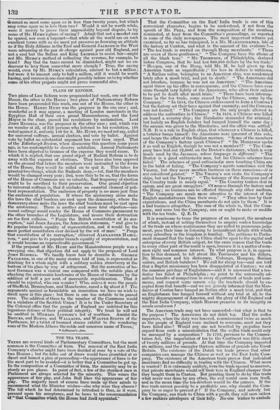PLANS OF REFORM.
Two plans of Law Reform were propounded last week, one out of the House, the other in the House ; two plans of Parliamentary Reform have been propounded this week, one out of the House, the other in the House. HENRY HUNT was the proposer in the one case ; and, wonderful as it may appear, a meeting. of London merchants in the Egyptian Hall of their own proud Mansionhouse, and the Lord Mayor in the chair, passed his resolutions by acclamation.. Lord JOHN RUSSELL Wag the proposer in the other case ; and, which was no wonder at all, of 328 persons who listened to his resolution, 188 voted against it, and only 140 for it. Mr. HUNT, we need not say, called for universal suffrage, annual election, and vote by ballot. Against vote by ballot no substantial argument has ever been urged. That of the _Edinburgh Review, when discussing this question some years ago, is too contemptible to deserve refutation. Annual Parliaments have been objected to because of the expense they would cause. To which it is replied, that one grand object of Radical Reform is to do away with the expense of elections. They have also been opposed on the ground that before the members were instructed in the forms of the House, they would be called on to quit it. This takes for granted two things, which the Radicals deny,—lst, that the members would be changed every year; 2nd, were they to be so, that the forms of the House of Commons are so valuable, that frequency of election ought to be sacrificed to their preservation. One grand objection to universal suffrage is, that it excludes an essential element of poli- tical representation. The exclusion of property is no more just than the exclusion of population. If where the aristocracy alone make the laws the chief burdens are cast upon the democracy, where the democracy alone make the laws the chief burdens must be cast upon the aristocracy. There is another and more fatal objection—uni- versal suffrage would render the House of Commons paramount to the other branches of the Legislature, and insure their destruction on the first collision. " Purge the British constitution of its cor- ruption," said JOHN ADAMS, the American statesman, "and give to rts popular branch equality of representation, and it would be the most perfect constitution ever devised by the wit of man." " Purge that constitution of its corruption," observed ALEXANDER HAMIL- TON, " and give to its popular branch equality of representation, and it would become an impracticable government."* If the proposal of Mr. Husrr and the Mansionhouse people was a sweeping one, that objection did not apply to the proposal of Lord JOHN RUSSELL. We hardly know how to describe it. GEORGE FAULKNER, in one of the many stories told of him, is represented as chinking for a whole night with a solitary sodden _strawberry at the bottom of his glass by way of refrigerant. But the corrective of ho- nest GEORGE was a violent one compared with the notable plan of checking the aristocratic tendencies of the House of Commons by the addition of half a per cent. of mercantile republicanism. That it should be rejected, who can wonder ? Who, unless it were the people of Sheffield, Birmingham, and Manchester, cared a fig about it ? The arguments against so formidable an innovation we have no wish to dwell upon in this place ; but there is one too notable to be passed over. The addition of three to the number of the Commons would be a violation of the Scottish Union ! It is to the Under Secretary of the Colonial office that the people of England are indebted for this Ingenious defence of their political integrity. We trust he will not be omitted in DiricirAsr. TANNING'S list of worthies. Amidst the BRUCES, and BURNS, and WALLACES, and WALTER SCOTTS of the Parthenon, let a tablet of bronzed stucco exhibit to the wondering sons of the Modern Athens the noble and sonorous name of Twiss.; 'k Jefferson's Ana.


















 Previous page
Previous page